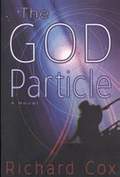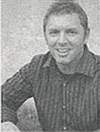Writing the Follow-up Novel |
Post Reply 
|
| Author | |
SFReader 
Admin Group 
SFReader Webmaster Joined: Feb-26-2015 Status: Offline Points: 521 |
 Post Options Post Options
 Thanks(0) Thanks(0)
 Quote Quote  Reply Reply
 Topic: Writing the Follow-up Novel Topic: Writing the Follow-up NovelPosted: Mar-09-2015 at 7:08am |
|
Writing the Follow-up Novel -- You Aren’t Really a Sophomore
by Richard Cox
Author of The God Particle: A Novel
The writing bug comes early. You’re a kid with ideas, with a desire to get them on paper, and one day you realize that you’re not ever going to stop. You also realize that some people actually make a living writing books, and since you’re going to be doing it anyway, why not get paid for the effort? You figure you’ll write a novel, find an agent to represent it, and land a fat publishing contract. Use the advance to pay for your mortgage, give yourself plenty of time to write another book. And so on. For most of us it isn't that easy. What you actually do is write a novel (a science thriller, in my case) in the evenings after work, spend a year or so on it, and then submit it to ten agents. You’re rejected by all of them, so you rewrite the book and submit it to a different list of ten. All of those agents reject you, too. You keep trying. After forty or so rejections, you begin to suspect this novel isn't going to sell. You've spent thousands of hours on it and the last thing you want to do is shove it into a drawer, but you don’t have any other ideas. Then one day, out of the blue, you think of one. You sit down and write and realize how much your skills have improved. The words pour out of you. A year later you've written the first draft of a second novel (Rift, in my case) and you eagerly submit the thing to agents, knowing this time you've got a winner. More rejections. Lots of them. You consider giving up, but by now you’re determined more than ever to succeed. And finally, miraculously, an agent agrees to represent you. He asks for a couple more rewrites, but that’s okay. You've come this far. You’ll do anything to break into print. After several months you’re done with the manuscript. Your agent submits it to publishers, and all you get is more rejections. But then one day you answer the phone, and it’s your agent (what a couple of magical words those are -- “your agent”) announcing that an editor is interested in your novel. He tells you to expect a call from this editor. During the call, your agent says, you might be asked if you’re willing to write another science thriller. This, you realize, is because the editor might be thinking of a two book deal, so you eagerly say yes, you would be happy to write another science thriller. There’s only one small problem -- you don’t have any ideas for another science thriller. The inspiration for a novel is an elusive thing, and it doesn't come around often. But this is your writing career on the line, so you’d better think of another idea, and fast. During my agent search, over the course of eight years, I only had a couple of ideas that could support a novel. And yet, after speaking to the prospective editor, I went home, hopped on the Internet, and within a couple of hours had come up with the basic premise for my second novel, The God Particle. How did I manage to do this? I suppose I owe some of my success to Tim Berners-Lee. In 1980, while working as an independent contractor at CERN (a physics facility in Europe), Lee proposed the idea that became the World Wide Web, a now ubiquitous network of information that allows users to research information in a nonlinear, associative way. You read about an idea, click on hypertext links to other, related ideas, and pretty soon you end up learning about subjects that weren't even on the radar when you started. This is exactly what I did. Ever since I was a kid I've been interested in science and spirituality, the different ways they describe the world around us. I’m also interested in the amazing abilities of the human brain. So I went to Google and typed in something like “god science brain universe consciousness.” I don’t remember exactly what sites and pages this search returned, but every time I visited a page I learned something new. Part of what I read was pure speculation, but a lot of essays were written about hard scientific research. Everything I found positioned the subject matter a slightly different way, or mentioned something completely new, and so I clicked and I clicked and I clicked some more. The World Wide Web never looked so good to me. I began working on the new book, and a few days later received the most important phone call of my life. I was having lunch in an Italian restaurant when my agent called to tell me that my novel, Rift, had been purchased by the prospective editor. This is a moment that can only be experienced once, and it is special. I don’t think I had a coherent thought the rest of the day. The book deal in fact was for two books, so it was a good thing I’d already begun writing the next one. In the days that followed, many people asked if I was worried about being paid for a book that hadn't even been written yet. But when you've spent your entire adult life working toward publication, seeing that dream become reality drives you like never before. You find energy reserves that until then had been hidden from you. You’re suddenly able to see the positive side of every situation. You’re essentially born anew. But you still have to sit down and write the book. You have to write every day in which it’s realistically possible -- even some days when it isn't. When you’re finished, you have to write it again, and again, and when your editor sends it back requesting significant changes, you realize how fortunate you are to have such a talented person involved in the creative process. You don’t worry about the advance on an unwritten work because by now you've written a couple of novels (you aren't really a sophomore), and you know you can do it again. And miracle of miracles, the second one turns out better than the first. Earns rave reviews. You only hope someone will buy the darn thing. In the meantime you've written a third one and are sketching ideas for a fourth. It’s what you've always wanted, even if it hasn't taken the exact form you expected. You’re a writer. Copyright © 2005 Richard Cox
Formore information, please visit the author's website at www.richardcox.net. |
|
 |
|
| Sponsored Links | |
 |
|
Post Reply 
|
|
|
Tweet
|
| Forum Jump | Forum Permissions  You cannot post new topics in this forum You cannot reply to topics in this forum You cannot delete your posts in this forum You cannot edit your posts in this forum You cannot create polls in this forum You cannot vote in polls in this forum |
Copyright ©2001-2015 Web Wiz Ltd.
This page was generated in 0.328 seconds.








 Topic Options
Topic Options You've heard this story before.
You've heard this story before.

